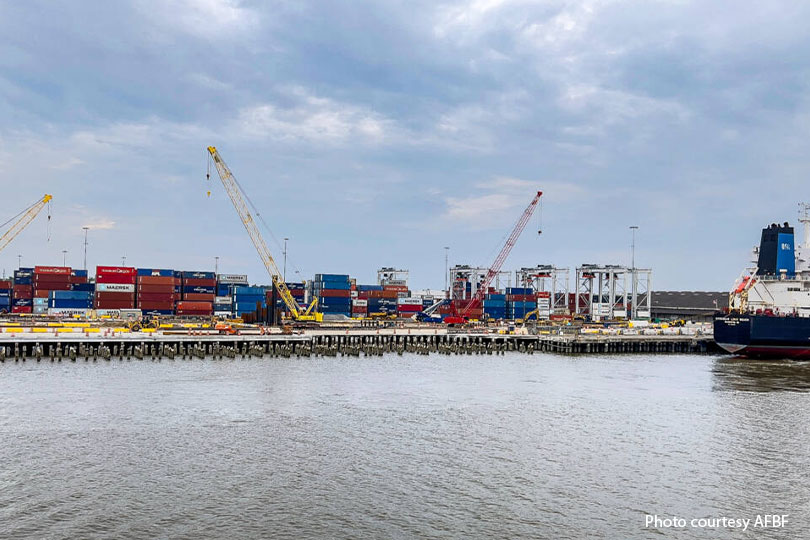By Jessica Domel
Multimedia Reporter
The United States will soon implement an across-the-board 10% tariff on all goods exported to the U.S. and will levy additional reciprocal tariffs up to 34% on countries with which the nation has the highest trade deficit.
U.S. President Donald Trump announced the new tariffs in a press conference in the White House’s Rose Garden Wednesday, April 2.
“For decades, our country has been looted, pillaged, raped and plundered by nations near and far, both friend and foe alike,” Trump said. “American steel workers, auto workers, farmers and skilled craftsmen really suffered gravely. They watched in anguish as foreign leaders have stolen our jobs, foreign cheaters have ransacked our factories and foreign scavengers have torn apart our once beautiful American dream.”
The president dubbed the day “Liberation Day” and said it is one of the most important days, in his opinion, in American history.
“It’s our declaration of economic independence. For years, hardworking American citizens were forced to sit on the sidelines as other nations got rich and powerful, much of it at our expense, but now it’s our turn to prosper and in so doing use trillions and trillions of dollars to reduce our taxes and pay down our national debt, and it’ll all happen very quickly,” Trump said. “With today’s action, we are finally going to be able to make America great again—greater than ever before.”
The flat 10% tariff on all nations is expected to go into effect Saturday, April 5.
The reciprocal tariffs, which vary by country, are set to go into effect Wednesday, April 9.
The White House reports the tariffs will remain in effect until the president determines the threat posed by the trade deficit and underlying nonreciprocal treatment is satisfied, resolved or mitigated.
The reciprocal tariffs, according to a White House chart, will be levied on China at 34%; the European Union at 20%; Vietnam at 46%; Taiwan at 32%; Japan at 24%; India at 26%; Cambodia at 49% and South Korea at 25%.
The reciprocal tariffs will be levied on top of existing tariffs but include the 10% across-the-board tariff announced Wednesday.
Canada and Mexico will reportedly not be impacted by the new tariffs.
Following the announcement, several agricultural organizations expressed their support and some concerns with the new tariffs and the impacts they could have on trade, farmers and ranchers.
“Texas Farm Bureau (TFB) understands President Trump’s use of tariffs as a negotiating tool. We support the goal of achieving a level playing field in U.S. trade relationships, and we hope new export opportunities become available for Texas farmers and ranchers,” TFB President Russell Boening said. “However, tariffs can cause significant challenges for farm and ranch families by increasing the cost of inputs, which cannot be transferred to consumers.”
Boening said retaliatory tariffs, which were threatened both before and after President Trump’s announcement Wednesday, are a concern due to their negative impact on market prices for commodities.
“These additional challenges place an undue burden on producers who are already grappling with extremely high input costs, inflation, low commodity prices and continued delay in achieving a stronger safety net with a new farm bill,” Boening said.
More than 20% of U.S. farm income comes from exports.
“It is critical the interests of farm and ranch families be protected as tariffs are implemented,” Boening said. “We simply cannot afford to lose ground in global markets as farm and ranch families are already facing the largest downturn in the agricultural economy since the 1980s.”
Boening said TFB looks forward to working with the administration to ensure any trade actions taken create more opportunities and certainty for farmers and ranchers as they work to provide the food and fiber of our nation.
U.S. Secretary of Agriculture Brooke Rollins told reporters recently Trump will take care of farmers. She said the timeline for providing support to farmers depends on the action the president takes this week.
According to Agri-Pulse, Rollins said the administration will need to know the impacts the action has on agriculture before any action is taken.
Officials from China threatened new retaliatory tariffs on the U.S. this week, as did the European Union.
Ursula von der Leyen, president of the European Commission, said the EU feels let down by its oldest ally.
“Europe has everything it needs to make it through the storm,” von der Leyen said. “We are in this together. If you take on one of us, you take on all of us.”
Officials there are expected to meet this week to discuss the retaliatory tariffs on U.S. exports. The EU reportedly remains open to trade negotiations with the U.S.


Leave A Comment